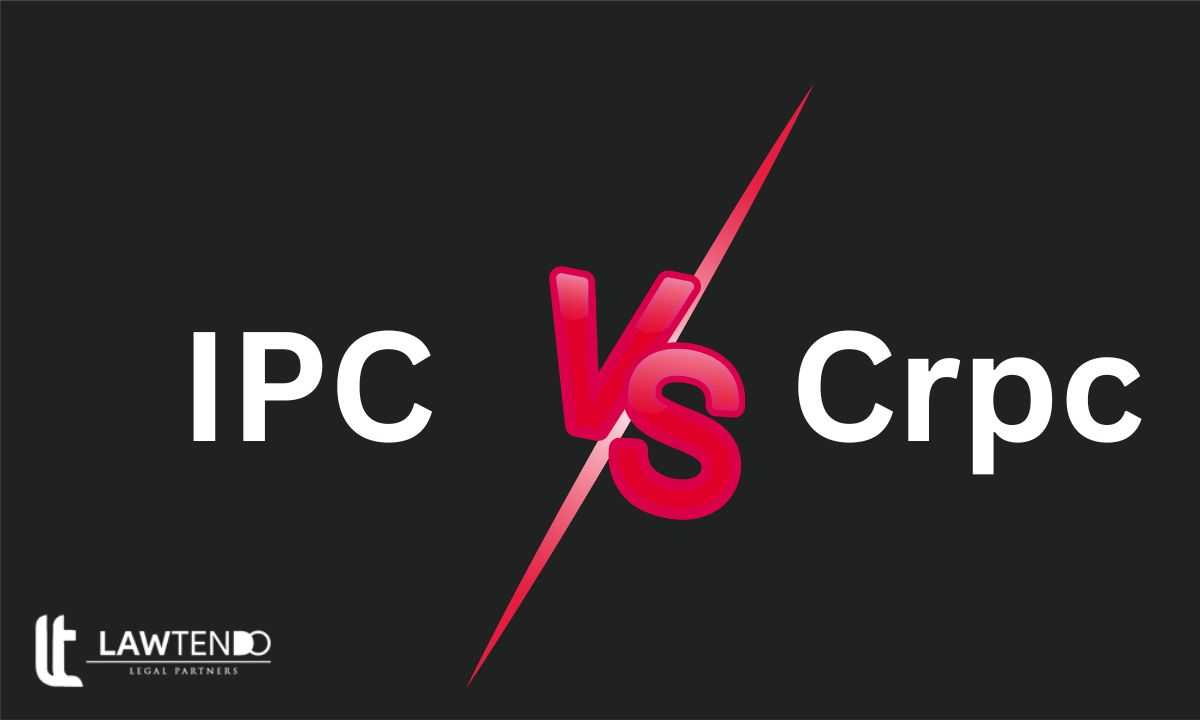Difference between IPC and CrPC?

Date : 23 Nov, 2023
Post By admin
|
While IPC says what is considered a crime, CrPc says how to deal with that crime. |
Introduction
The difference between IPC and CrPC in the Indian criminal justice system is in their jobs. IPC sets the rules about what counts as a crime and what punishment it carries. It focuses on the specific acts that are considered crimes and the consequences for them.
On the flip side, CrPC handles the process of dealing with a crime. It tells the police, courts, and correctional institutions what steps to take during the investigation, prosecution, and trial of criminal offenses. It provides a framework for making sure the rules set by IPC are followed.
In summary, IPC gives us the substance of criminal law, saying what's right and wrong, while CrPC gives us the procedure to enforce those rules. Without CrPC, the system wouldn't be able to effectively make sure IPC's rules are followed. So, both IPC and CrPC are vital for keeping law and order in India.
Advantages of Indian Penal Code (IPC)
While we read about the differences between IPC and CrPC, let us see the individual features of both.
India relies on the Indian Penal Code (IPC) as its primary criminal law, and there are several benefits to using this legal framework:
Clarity in Language:
The IPC is written in clear and understandable language, making it accessible to a broad audience.
Comprehensive Coverage:
It addresses a wide range of criminal offenses, including murder, theft, and fraud, providing a comprehensive legal framework.
Historical Adaptability:
Enacted in 1860, the IPC has evolved over the years through amendments to align with changing societal norms and legal requirements.
Legal Consistency:
It treats all citizens equally, ensuring a consistent approach to dealing with criminal offenses throughout the country.
Global Recognition:
The IPC has gained international recognition and is adopted by many countries as their criminal code.
Support for Law Enforcement:
The IPC equips law enforcement agencies in India with the necessary legal tools to combat crime effectively, aiding in the maintenance of law and order.
Disadvantages of Indian Penal Code (IPC)
While the IPC has its merits, it also comes with some drawbacks:
Complex Language:
The language and structure of the IPC can be challenging for the average person to understand.
Limited Scope on Technology:
Modern technological issues, like cybercrime, are not adequately addressed in the IPC.
Gender and Community Bias:
Certain provisions of the IPC have faced criticism for being discriminatory, especially against women and marginalized communities.
Lack of Alternative Punishments
The IPC lacks provisions for alternative punishments or rehabilitation, leading to an overreliance on imprisonment.
Victim Rights Oversight:
The criminal justice system lacks a comprehensive mechanism to protect victim rights, potentially resulting in re-victimization.
Abuse of Power:
Powerful individuals can misuse the IPC to falsely accuse innocent people, highlighting issues of fairness.
Discriminatory Implementation:
In practice, the IPC is sometimes implemented in a discriminatory manner, with marginalized communities and lower castes facing disproportionate targeting and punishment.
Advantages of Criminal Procedure Code (CrPC)
The CRPC brings several advantages to the Indian criminal justice system:
Fair Investigation Guidelines:
Clear guidelines for investigating criminal offenses, outlining the powers and duties of investigating officers, and ensuring the rights of suspects and witnesses.
Accused Rights Protection:
Safeguards the rights of the accused, including provisions for bail, a fair trial, and legal representation.
Speedier Trials:
Expedites the disposal of criminal cases through summary trials, fast-track courts, and plea bargaining provisions.
Transparency and Accountability:
Establishes clear rules and procedures, promoting transparency and accountability in the investigation, prosecution, and trial of criminal offenses.
Separation of Powers:
Ensures the separation of police, prosecution, and courts, maintaining impartial and independent investigations, prosecutions, and trials.
Disadvantages of Criminal Procedure Code (CrPC)
However, the CRPC also has its share of drawbacks:
Technological Lag:
Criticized for being outdated and not keeping pace with technological and societal changes.
Rights Protection Issues:
Inadequate protection of suspects and defendants' rights, leading to potential human rights abuses.
Misuse by Law Enforcement:
Law enforcement officials may misuse the CRPC, resulting in arbitrary arrests and prolonged detentions without trial.
Victims' Rights Oversight:
Insufficient provisions for protecting victims' rights, contributing to the possibility of re-victimization.
Limited Rights for the Accused:
The CRPC lacks a comprehensive mechanism for protecting the rights of the accused, with arbitrary arrests, torture, and prolonged detentions being common.
Over Reliance on Imprisonment:
The CRPC lacks alternative forms of punishment or rehabilitation, contributing to an overreliance on imprisonment.
Discriminatory Implementation:
Similar to the IPC, the CRPC may be implemented in a discriminatory manner, with marginalized communities and lower castes facing disproportionate targeting and punishment.
Conclusion
In essence, while the IPC deals with the substance of criminal law, the CrPC focuses on the procedural aspects, working together to ensure the fair and just enforcement of laws in India.To conclude, if you want to know any more details about the difference between IPC and CrPc, please get in touch with our experts at Lawtendo and we might be able to give you informative insights on the same!





